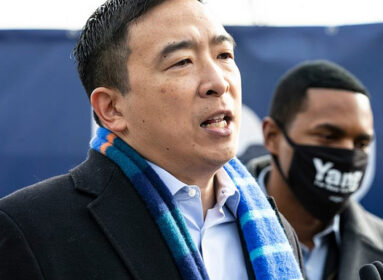By Maxine Dovere / JNS.org

Israeli Deputy Foreign Minister Danny Ayalon speaks at the Sept. 21 “Justice for Jews from Arab Countries” conference he hosted in New York. Credit: Maxine Dovere.
NEW YORK—Danny Ayalon anticipates dramatic changes for Israel, the Middle East and Europe, giving a decade as his timeframe.
In an exclusive conversation with JNS.org on Sunday, Sept. 30 in New York, Israel’s deputy foreign minister said that, while it is unrealistic to expect any nation dependent on Arab oil to jeopardize its economic wellbeing to publicly support Israel, changes in energy availability “will be the next segment of geo-strategic planning” for the Jewish state.
Israel’s recent discoveries of extensive natural gas resources can change the real politic, according to Ayalon. With the ability to export fuel from its recently discovered — and extensive — natural gas reserves, Israel will be able to dramatically alter political relations and current political positioning within 10 years, he said.
Emphasizing the extensive bilateral, albeit under the radar, cooperation in multiple areas between Israel and many of its Arab neighbors, Ayalon told JNS.org that such cooperation is “a very important reflection of positive bilateral activities and associations.” The problem, he said, is “with votes in public” — when privately friendly nations, including Arab and non-aligned countries, are “under public pressure” to vote against Israel.
Ayalon came to the UN to draw attention to the 850,000 Jewish refugees driven out of their homes in Arab countries following the declaration of Israeli statehood. Speaking at the Sept. 21 “Justice for Jews from Arab Countries” conference he hosted, Ayalon said the government of Israel “has decided to flush out the truth — to teach our children the truth in a systematic way.”
For more than six decades, little was done to recognize Jewish refugees. But on Feb. 22, 2010, the Knesset adopted legislation declaring the discussion of the plight of Jewish refugees from Arab countries to be an integral part of any peace negotiation.
The Knesset legislation came after passage of a non-binding resolution in the United States House of Representatives in 2008 requiring every reference to Palestinian refugees be mirrored by “explicit reference” to the refugee communities of Jews from Arab lands. The Knesset proposal was passed by an unusual coalition: sponsored by MK Nissim Ze’ev, a member of the right-leaning Shas party largely supported by Jews from Arab countries and their descendants, together with a group of Zionist parties, including the left-leaning Labor and Meretz parties. Before a packed room Sept. 21, Ayalon said, “There will not be a final peace until the questions of the refugees is solved.”
“We will not arrive to peace without solving the refugees’ problems on both sides of the line…with real respect of each for the other,” he said.
Ayalon assured Arab leaders that “this is not something designed to discomfort or condemn or be an obstacle to peace.” He called the action “a bridge to peace — a real peace with security justice and longevity. Based on the truth even if the truth is not comfortable.”
Leaving behind the public proclamations and protests shouted from the public forum of the UN, Ayalon went on to take significantly positive, albeit cautious, positions at a separate Sunday morning briefing in New York.
“On a bilateral basis, Israel is not too isolated, as measured by investments, tourism, and integration of its ideas in the real world,” he said.
Warning of the “tyranny and evil forces threatening all of Western Civilization” and attacks by Islamist regimes “because of who we are and what we represent,” Israel, said the deputy foreign minister, “must be prepared for any eventuality…Israel today is not defenseless: we have the capability to defend ourselves, by ourselves.”
“I am very optimistic about how we can meet the challenges of the future,” he said, noting the many investors, scientists and experts who seek Israeli cooperation and assistance.
At the Sept. 21 Jewish refugees conference, Ayalon was not reluctant to criticize the UN.
“I cannot name one war or genocide that has been prevented by the UN,” he said. Calling the international body “a political organization without enforcement capabilities,” Ayalon assured that Israel “will never allow the United Nations to dictate the mandates of peace or Israel’s security.”
“When [Palestinian Authority President] Abu Mazen threatens to go to the UN to get the status of a state, it is wrong… It is against the agreements and principles of the UN,” he said. Ayalon reminded that “member” status has never been granted to a state lacking bilateral agreements with its neighbors. “The Palestinians are trying to put the procedure backwards,” he said. “Why? Because they do not want peace with Israel.”
“We can no longer afford to be politically correct in the face of antisemitism rising in Europe” and the threat of radical Islam in the Middle East, Ayalon said. It is “time to be not politically correct, but rather, to be correct,” he said.
“Israel is telling the world that if the United Nations allows Palestine to push through [the unilateral declaration of statehood], this is slamming the door shut on any future peace,” he said. Despite the reality of the “automatic majority” including Arab and unaligned nations ordinarily aligned against Israel, Ayalon called on the “moral majority of 50 to 60 countries” to stymie any proposal of Palestinian statehood.”
“We hope that there will be responsibility among the responsible countries of the world,” he said. Acknowledging both existential and practical threats to Israel, Ayalon said the “threat to our right to defend ourselves is just as dangerous as the defense itself.”
“We are at the front line, in the trenches… If Israel’s well-being is compromised, so will [the well-being of] the entire international community,” he said. Using a “no choice” analogy, he said Israel “will no longer be the lamb.”
“We shall be the lion, especially in the volatile surrounding of the Middle East.”








 Southern New England Jewish Ledger
Southern New England Jewish Ledger














